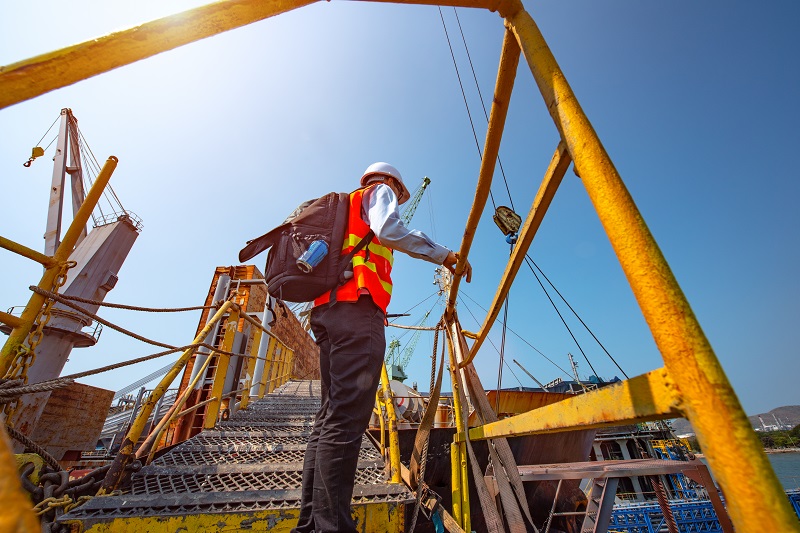 Seafarer joining vessel. Credit: Shutterstock
Seafarer joining vessel. Credit: Shutterstock
LONDON – The International Chamber of Shipping (ICS), representing 80% of the world's merchant fleet, has warned that current supply chain disruption is set to be compounded by a shortfall in the global shipping workforce due to the Russian invasion of Ukraine.
The Seafarer Workforce Report, published in 2021 by BIMCO and the International Chamber of Shipping, reports that 1.89 million seafarers are currently operating over 74,000 vessels in the global merchant fleet.
To maintain trade levels, these seafarers must be able to join and disembark ships (crew change) freely across the world. However, flights have been cancelled to and from the region, making this increasingly difficult. Fears over crew safety and increasing insurance premiums to send ships to Ukraine or Russia have also discouraged shipowners from sending vessels to these countries. Industry has reported that some crews have abandoned their ships in Ukraine due to security worries.
Of shipping's total workforce, 198,123 (10.5%) of seafarers are Russian, of which 71,652 are officers and 126,471 are ratings. Ukraine accounts for 76,442 (4%) of seafarers of which 47,058 are officers and 29,383 are ratings. Combined they represent 14.5% of the global workforce.
ICS's warning comes ahead of an Extraordinary Meeting of the UN, under the auspices of the International Maritime Organization (IMO), where industry will present an eight-point plan on how to ensure seafarer wellbeing. This will include calls for states to ensure seafarers access their pay, and for the establishment of safe corridors for ships to leave ports in Ukraine.
Speaking ahead of an address to UN member states at an urgently convened meeting of the IMO, Guy Platten, Secretary General of the International Chamber of Shipping said:
“The conflict in Ukraine is having a significant impact upon the safety and security of seafarers and shipping in the area. As with COVID, seafarers are being exposed to issues not of their making. Multiple ships have been hit by munitions, seafarers have been killed and injured and seafarers of all nationalities are trapped on ships berthed in ports. It is of the utmost urgency that their evacuation from these areas of threat should be ensured by those States with the power to do so. The impact upon innocent seafarers and their families cannot be underestimated.
“ICS fully supports the establishment of a maritime corridor to allow the safe evacuation of ships that are currently unable to leave territorial waters in the Black Sea and the Sea of Azov. They must be allowed to depart the area of conflict and avoid further humanitarian incident.”
Shipping is currently responsible for the movement of nearly 90% of global trade. Ukraine and Russia alone account for a quarter of all global wheat exports, while Russia controls 12.5% of crude petroleum exports, according to the Observatory of Economic Complexity (OEC). Already, Lloyd's List estimates that exports of crude and oil products from Russia have fallen by 1.5m barrels per day, from prior estimated levels of some 7m bpd before the Ukraine invasion.
ICS has previously warned of a shortage of merchant sailors to crew commercial ships if action is not taken to boost numbers, raising risks for global supply chains. This has been compounded by draconian travel restrictions, brought on by the pandemic, that saw seafarers unable to crew change and resulted in hundreds of thousands overstaying contracted periods at sea.
Research carried out by ICS reported that the average ship has a mix of at least three nationalities on board, and sometimes as many as thirty. Three languages were the minimum spoken on the average ship.
Source: ICS
The opinions expressed herein are the author's and not necessarily those of The Xinde Marine News.
Please Contact Us at:
media@xindemarine.com


 Ningbo Containerized Freight Index Weekly Commentar
Ningbo Containerized Freight Index Weekly Commentar  Ningbo Containerized Freight Index Weekly Commentar
Ningbo Containerized Freight Index Weekly Commentar  Ningbo Containerized Freight Index Weekly Commentar
Ningbo Containerized Freight Index Weekly Commentar  BIMCO Shipping Number of the Week: Bulker newbuildi
BIMCO Shipping Number of the Week: Bulker newbuildi  Ningbo Containerized Freight Index Weekly Commentar
Ningbo Containerized Freight Index Weekly Commentar  Ningbo Containerized Freight Index Weekly Commentar
Ningbo Containerized Freight Index Weekly Commentar